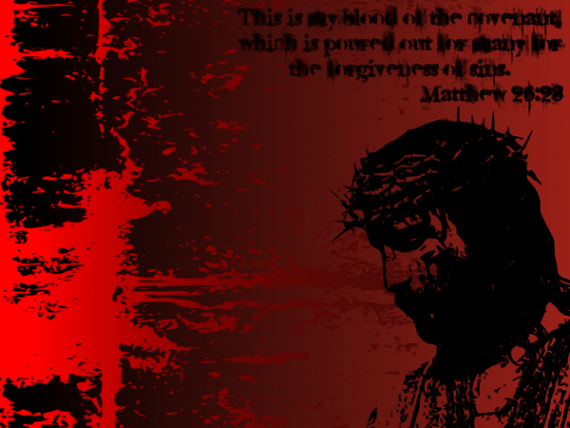Matthew 12:31-32 teaches about forgiveness and the unforgivable sin. What is this sin? How is it committed? And how can you know you have not committed it? These are the sorts of questions I attempt to answer in this study of Matthew 12:31-32.
Note that this study is an excerpt from my Gospel Dictionary online course. This course considers 52 key words of the Gospel and thousands of biblical texts. The course contains over 100 hours Bible teaching. You can take the course by joining my online discipleship group.
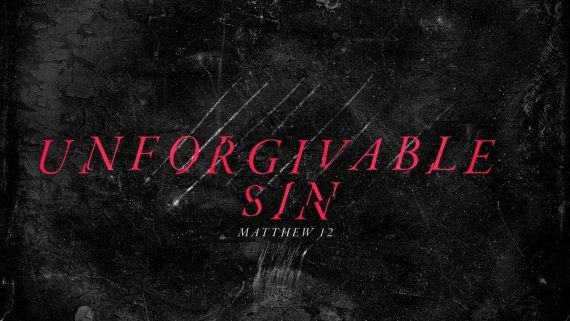
The Unpardonable Sin in Matthew 12:31-32
Therefore I say to you, every sin and blasphemy will be forgiven men, but the blasphemy against the Spirit will not be forgiven men. Anyone who speaks a word against the Son of Man, it will be forgiven him; but whoever speaks against the Holy Spirit, it will not be forgiven him, either in this age or in the age to come.
(#AmazonAdLink) 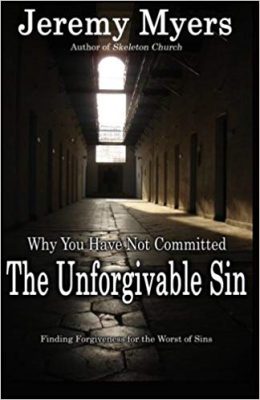 This passage contains information about the most-feared sin in all of Scripture: the sin of blasphemy against the Holy Spirit. I have written an entire book on this passage called (#AmazonAdLink) Why You Have Not Committed the Unforgivable Sin, and so will try to keep my comments about this text relatively brief.
This passage contains information about the most-feared sin in all of Scripture: the sin of blasphemy against the Holy Spirit. I have written an entire book on this passage called (#AmazonAdLink) Why You Have Not Committed the Unforgivable Sin, and so will try to keep my comments about this text relatively brief.
The Most Common View about the Unforgivable Sin
Most discussions about the unforgivable sin focus on the nature of what this sin is, and how it can be avoided.
The difficulty with this approach is that while Jesus does talk about speaking against the Holy Spirit, He doesn’t explicitly state what words constitute blasphemy. Since the religious leaders in the preceding context accuse Jesus of casting out demons by Beelzebub (Matt 12:24), many assume that the sin of blasphemy against the Spirit is when someone attributes the work of the Holy Spirit to Satan (cf. Mark 3:28-30).
There are numerous problems with such a view, not least of which is the fact that Jesus is clearly providing a warning to the Pharisees that they were about to commit this sin.
In other words, they had not yet committed it, but if they continued on the path they were on, they might. So if they had not yet committed this sin, then this means that attributing the work of the Holy Spirit to Satan is not blasphemy against the Holy Spirit.
Besides, if it were, we would never be able to “test the spirits” as John calls us to do (1 John 4:1), for we would be too fearful of blaspheming the Spirit to ever say that a certain work was not from God.
The Bible Doesn’t State what the Unforgivable Sin Actually IS
So the truth of the matter is that the Bible does not explicitly state what constitutes blasphemy against the Holy Spirit.
 This is actually a good thing. Just as a sign that says, “Do not walk on the grass” causes people to walk on the grass, if the Bible clearly stated what words constituted blasphemy against the Holy Spirit, this would only encourage people to say the words even more. So we don’t precisely know what this sin is.
This is actually a good thing. Just as a sign that says, “Do not walk on the grass” causes people to walk on the grass, if the Bible clearly stated what words constituted blasphemy against the Holy Spirit, this would only encourage people to say the words even more. So we don’t precisely know what this sin is.
Nevertheless, we do know a few things about the nature of this sin. One of the tasks of the Holy Spirit is to convict the world of sin, righteousness, and judgment (John 16:7-11). If a person says something vile and mean to the Holy Spirit or about the Holy Spirit, and then feels guilty or ashamed of what they have said, this is clear evidence that the Holy Spirit is still at work in their life convicting them of sin, righteousness, and judgment.
The fact that the Holy Spirit is still at work in their life indicates that the Spirit has not left or abandoned them, and therefore, they have not committed the unforgivable sin. In other words, those who fear that they have committed the unforgivable sin, thereby have evidence that they have not committed it. It is only those who have no shame or guilt about their words or actions who might possibly have committed this sin, yet they would never even know they have, because the Spirit is not at work in their life to convict them of sin.
All of this is discussed further in my book on the unforgivable sin.
Key Insight on the Unforgivable Sin: The TYPE of Forgiveness Jesus is Talking About
One of the things I also write about in that book, however, is something that is rarely discussed elsewhere in other books about the unforgivable sin. While most books focus only on what this sin is, few books discuss what type of forgiveness Jesus is talking about in this passage. Yet this is the crucial key which helps explain what Jesus is saying.
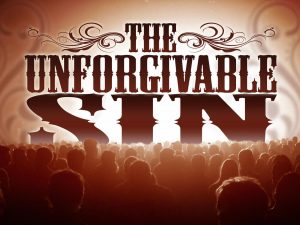 The word that is used for “forgiveness” throughout this passage is aphēsis. This means that whatever the sin of blasphemy against the Holy Spirit is, it also is under the charizomai forgiveness of God. In other words, whatever this sin is, it too is a sin that God has forgiven from eternity past (See the two types of forgiveness).
The word that is used for “forgiveness” throughout this passage is aphēsis. This means that whatever the sin of blasphemy against the Holy Spirit is, it also is under the charizomai forgiveness of God. In other words, whatever this sin is, it too is a sin that God has forgiven from eternity past (See the two types of forgiveness).
Remember, God’s free charizomai forgiveness is based on His grace, and covers all sins of all people for all time, including the sin of blasphemy against the Holy Spirit. When this truth is recognized, we are then free to see that the text says nothing about God not forgiving those who commit this sin, but only that they will not receive aphēsis, that is, they will not be released from this sin.
But since God has already freely forgiven (charizomai) them for this sin, then why do they not receive aphēsis? Why are those people who commit this sin unable to find a release from it?
The answer is found in recalling that aphēsis often has conditions attached to it, and if a person does not meet these conditions, then they are not released. While God wants the people who commit this sin to be released from it, they refuse or are unable to meet the conditions for the release of this sin, and so do not find any release from it. In other words, it is not God who is refusing to release them from this sin, but the people themselves who refuse to be released.
As explained by multiple texts elsewhere in the Bible, the release of aphēsis begins within each individual person as they own up to what they did, repent of it, and forgive themselves for it. Finding release from sin is based on understanding that we have been freely forgiven by God, and so we too can freely forgive ourselves and others, and as a result of this free forgiveness, begin admit our failures and work to change the patterns that led to this sin in the first place.
But the person who never recognizes the truth about God’s free forgiveness and how to break free from the bondage of sin in their life, will never find or experience forgiveness for themselves. They will remain “unreleased.”
This passage is not talking about an “unforgivable sin” but an “unreleasable sin.” It occurs when a person does not release themselves.
All sins are forgiven by God, but if a person does not forgive and release themselves, there is nothing more God can do.
Why is It called Blasphemy Against the Holy Spirit?
This sin is called blasphemy against the Holy Spirit because it is refusing to believe what the Holy Spirit says to us about our sin, and instead believes the lies of Satan. The Holy Spirit is saying to each and every person, “You have been freely forgiven! So live in light of that and be released from your enslavement to sin, shame, and guilt.”
But the person who refuses to accept forgiveness and release is denying the testimony of the Holy Spirit, and is instead believing the testimony of Satan, the accuser. While the Holy Spirit says, “You are forgiven!” Satan constantly says, “You are condemned!”
As long as a person believes Satan over the Spirit, they will remain under condemnation (Mark 3:29). As long as a person believes the lies of condemnation, they will live unforgiven lives. They will continue to be enslaved to the deceptions of the devil and in bondage to the corruption of sin. They will never experience the release from the bondage of sin, shame, and guilt.
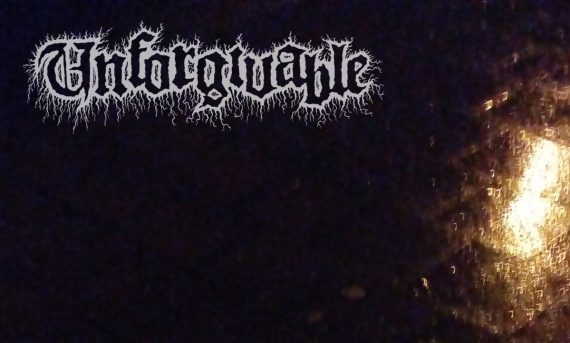
So What is the Unforgivable Sin?
To put it simply, the unforgivable sin is the sin of unforgiveness … directed at ourselves.
A person commits this sin by refusing to believe the testimony of the Holy Spirit that they are completely accepted and forgiven by God. They remain unforgiven, or unreleased, because they don’t forgive themselves. The unforgivable sin is the sin for which a person denies and rejects that God has forgiven them, and thus, they continue to beat themselves up about it and suffer the consequences.
The point of Jesus in Matthew 12:31-32 is that you can’t hang on to unforgiveness without paying a price. The only sin you are not forgiven for is the sin you don’t forgive yourself for. This state of refusing to accept the Spirit’s testimony about forgiveness only leads deeper into bondage and slavery to sin.
Jesus reveals that God has forgiven all people for all sins throughout all time. But if we believe the lie of the accuser and deny that we have been forgiven, then we will not believe we have been forgiven, and will continue to live a state of unforgiveness, as if we were eternally condemned.
So recognize that you have been forgiven for everything! Only when you do this will you be released from sin, shame, guilt, and fear, and will find true life in the Spirit that God wants for you.
 Understanding the Gospel requires us to properly understand the key words and terms of the Gospel. Take my course, "The Gospel Dictionary" to learn about the 52 key words of the Gospel, and hundreds of Bible passages that use these words.
Understanding the Gospel requires us to properly understand the key words and terms of the Gospel. Take my course, "The Gospel Dictionary" to learn about the 52 key words of the Gospel, and hundreds of Bible passages that use these words.
This course costs $297, but when you join the Discipleship group, you can to take the entire course for free.




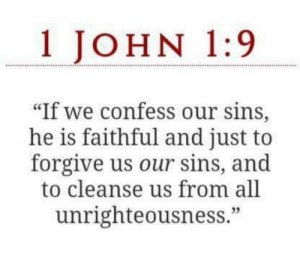 So what did the Apostle John mean when he wrote 1 John 1:9? To understand this verse, we need to understand three things. We need to understand the meaning of the word “confess,” the meaning of the word “forgive” and the overall message and theme of 1 John.
So what did the Apostle John mean when he wrote 1 John 1:9? To understand this verse, we need to understand three things. We need to understand the meaning of the word “confess,” the meaning of the word “forgive” and the overall message and theme of 1 John.
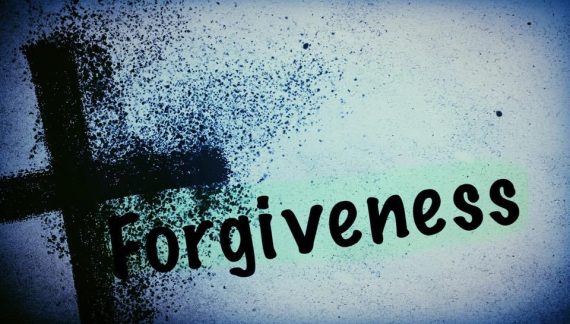
 You can have a relationship with somebody, but not fellowship. For example, if you had a fight with one of your parents several years back, you are still related to them and are still part of the family, but you might not call them on the phone or get together for holidays. You are related, but do not have fellowship. You are not abiding or remaining with them in an ongoing friendship.
You can have a relationship with somebody, but not fellowship. For example, if you had a fight with one of your parents several years back, you are still related to them and are still part of the family, but you might not call them on the phone or get together for holidays. You are related, but do not have fellowship. You are not abiding or remaining with them in an ongoing friendship. The first step in healing this brokenness is by confessing our sin and agreeing with God that what we did was wrong.
The first step in healing this brokenness is by confessing our sin and agreeing with God that what we did was wrong.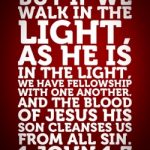
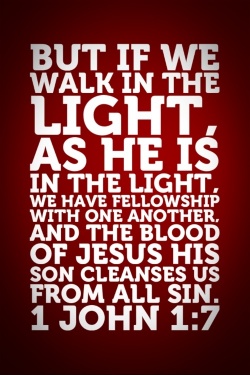 1 John 1:7-10 does get discussed in various ways through my online course “
1 John 1:7-10 does get discussed in various ways through my online course “ And while it is true that they might be guilty of some of the things we accuse them of, the human tendency is to amplify the sinful behavior of others so that we can turn them into monsters, and dehumanize them, so that we can condemn them, or send them into exile, or even kill them in the name of God.
And while it is true that they might be guilty of some of the things we accuse them of, the human tendency is to amplify the sinful behavior of others so that we can turn them into monsters, and dehumanize them, so that we can condemn them, or send them into exile, or even kill them in the name of God. There are
There are 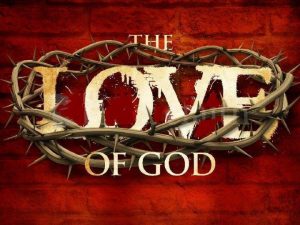 John is primarily interested in make sure that his readers recognize how they have been involved in the violent, bloody, accusatory, scapegoating practices that run this world, and turn from such behaviors to walk in the light of God’s love.
John is primarily interested in make sure that his readers recognize how they have been involved in the violent, bloody, accusatory, scapegoating practices that run this world, and turn from such behaviors to walk in the light of God’s love.
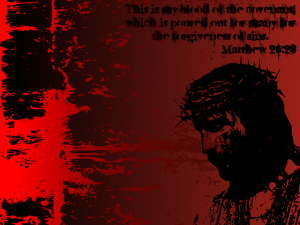 The basic message of Ephesians is that due to religion, humans have lived in rivalry and violence with each other since the foundation of the world, but now, in Jesus Christ, we have been shown a new way of living life so that all the hostilities can now cease.
The basic message of Ephesians is that due to religion, humans have lived in rivalry and violence with each other since the foundation of the world, but now, in Jesus Christ, we have been shown a new way of living life so that all the hostilities can now cease.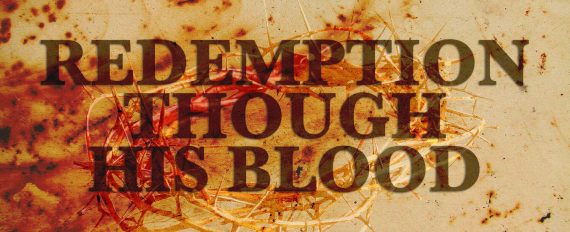
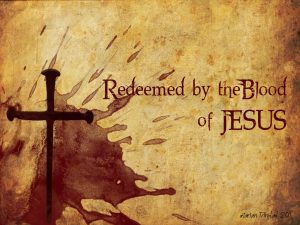 Paul’s point in these verses is that even though we humans accusation, blame, condemn and kill others in God’s name (Ephesians 2:1-3), God Himself does not behave that way toward us.
Paul’s point in these verses is that even though we humans accusation, blame, condemn and kill others in God’s name (Ephesians 2:1-3), God Himself does not behave that way toward us.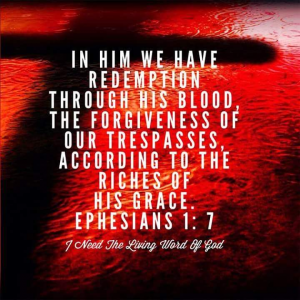 By looking at Ephesians 1:7 and Ephesians 2:13, we now understand how the blood of Jesus redeems us.
By looking at Ephesians 1:7 and Ephesians 2:13, we now understand how the blood of Jesus redeems us.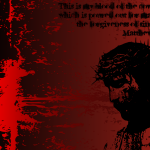
 But I bet you want a better explanation …
But I bet you want a better explanation … In reference the New Covenant, the blood of Jesus signaled that this New Covenant was now in effect. In essence, Jesus died to inaugurate or enact the New Covenant.
In reference the New Covenant, the blood of Jesus signaled that this New Covenant was now in effect. In essence, Jesus died to inaugurate or enact the New Covenant. There is charizomai forgiveness and aphēsis forgiveness. Charizomai forgiveness is based on the free grace (charis) of God and is freely extended to all people throughout all time for all sins, with no strings or conditions attached.
There is charizomai forgiveness and aphēsis forgiveness. Charizomai forgiveness is based on the free grace (charis) of God and is freely extended to all people throughout all time for all sins, with no strings or conditions attached.